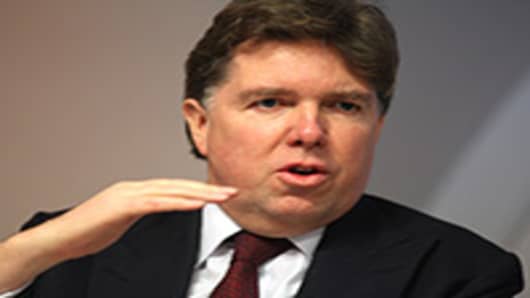Paul Tucker, the Bank of England's deputy governor, has accused investment banks of spending the last 20 years trying to dodge the rules.
He warned that under the Bank's new regulatory regime, officials would use their judgement to decide when banks were at risk of failure or when bosses were not fit to do the job - rather than rely on a prescriptive rulebook.
The tough talk comes just one month before the arrival of new Governor Mark Carney, who beat Tucker to the top job despite him being the bookies' favourite.
But Tucker said Carney would agree with the judgment-based approach to regulation and added he shared the values embodied by Eddie George, the former Governor who led the bank to independence.
Tucker, who refused to be drawn on speculation that he is considering a move to become chairman of Lloyds Banking Group, said that prudential regulation worked more effectively when banks did not get the opportunity to search out loopholes.
"Despite claiming not to like tick box supervision… over the last 20 years [banks] have found their way around the rulebooks," said Tucker.
He added: "A good deal of the problems that gave rise to the crisis manifested themselves in banks navigating around the rulebook."
In the question and answer session at the Institute for Government, Tucker said prudential supervision offered a financial health-check, where regulators looked for symptoms of problems rather than simply applying rules.
"In prudential supervision measures of capital adequacy and liquidity adequacy are indicators, not the rules," he said. "The kind of questions the prudential regulatory authority will be putting to management from time to time: your bank isn't as strong as you think it is, come back on your risk in your book; I'm afraid you are not fit to run the bank."
He said the sentiment would have been recognized by George and was a familiar concept for both King and Carney.
But Tucker questioned whether the City would really "embrace" the judgement-based world when regulators began to use those powers in earnest.
The new rules should make it possible for individual banks to fail, but when they do, they system must ensure the whole system does not grind to a halt, he said.
Within the global framework, the biggest financial institutions did not need to be too safe to fail. Rather, banks needed to be allowed to fail because it was possible for them to do so in an orderly way.
He added that he was confident that incoming changes would ensure that if banks collapsed in the future, losses went to bondholders rather than taxpayers.
"Bankers have been slow to understand that the debate about regulation won't go away until the economy is healed," Tucker said.


